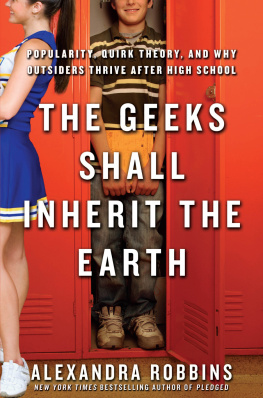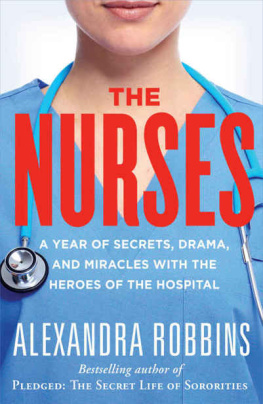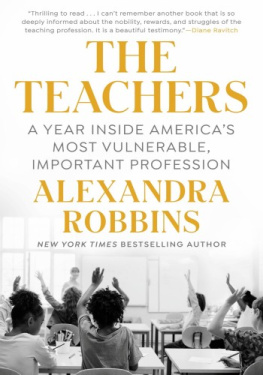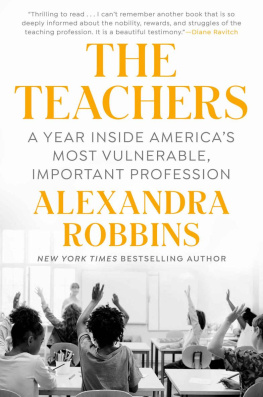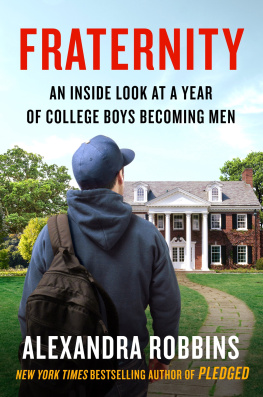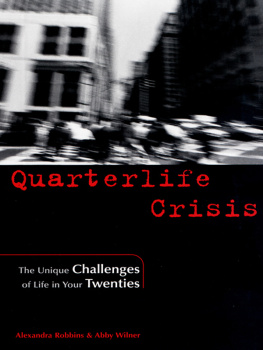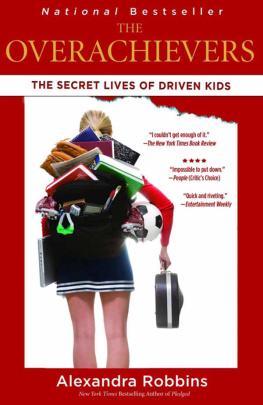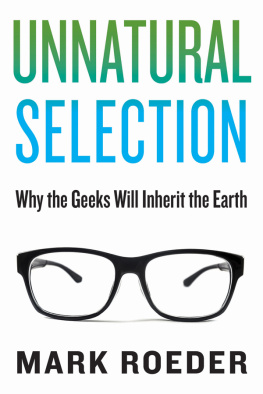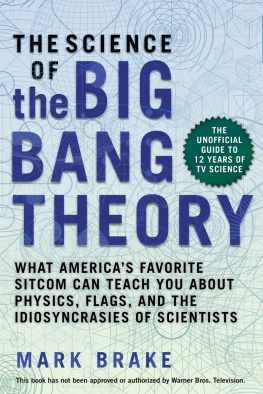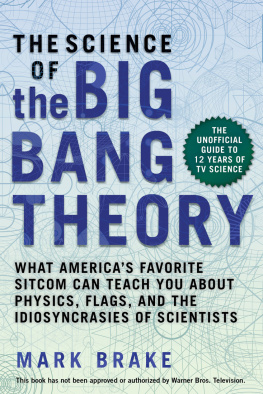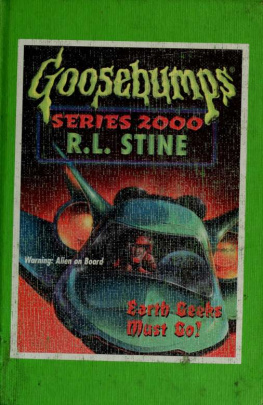Alexandra Robbins - The Geeks Shall Inherit the Earth: Popularity, Quirk Theory, and Why Outsiders Thrive After High School
Here you can read online Alexandra Robbins - The Geeks Shall Inherit the Earth: Popularity, Quirk Theory, and Why Outsiders Thrive After High School full text of the book (entire story) in english for free. Download pdf and epub, get meaning, cover and reviews about this ebook. year: 2011, publisher: Hyperion, genre: Science. Description of the work, (preface) as well as reviews are available. Best literature library LitArk.com created for fans of good reading and offers a wide selection of genres:
Romance novel
Science fiction
Adventure
Detective
Science
History
Home and family
Prose
Art
Politics
Computer
Non-fiction
Religion
Business
Children
Humor
Choose a favorite category and find really read worthwhile books. Enjoy immersion in the world of imagination, feel the emotions of the characters or learn something new for yourself, make an fascinating discovery.
- Book:The Geeks Shall Inherit the Earth: Popularity, Quirk Theory, and Why Outsiders Thrive After High School
- Author:
- Publisher:Hyperion
- Genre:
- Year:2011
- Rating:5 / 5
- Favourites:Add to favourites
- Your mark:
- 100
- 1
- 2
- 3
- 4
- 5
The Geeks Shall Inherit the Earth: Popularity, Quirk Theory, and Why Outsiders Thrive After High School: summary, description and annotation
We offer to read an annotation, description, summary or preface (depends on what the author of the book "The Geeks Shall Inherit the Earth: Popularity, Quirk Theory, and Why Outsiders Thrive After High School" wrote himself). If you haven't found the necessary information about the book — write in the comments, we will try to find it.
Alexandra Robbins: author's other books
Who wrote The Geeks Shall Inherit the Earth: Popularity, Quirk Theory, and Why Outsiders Thrive After High School? Find out the surname, the name of the author of the book and a list of all author's works by series.
The Geeks Shall Inherit the Earth: Popularity, Quirk Theory, and Why Outsiders Thrive After High School — read online for free the complete book (whole text) full work
Below is the text of the book, divided by pages. System saving the place of the last page read, allows you to conveniently read the book "The Geeks Shall Inherit the Earth: Popularity, Quirk Theory, and Why Outsiders Thrive After High School" online for free, without having to search again every time where you left off. Put a bookmark, and you can go to the page where you finished reading at any time.
Font size:
Interval:
Bookmark:
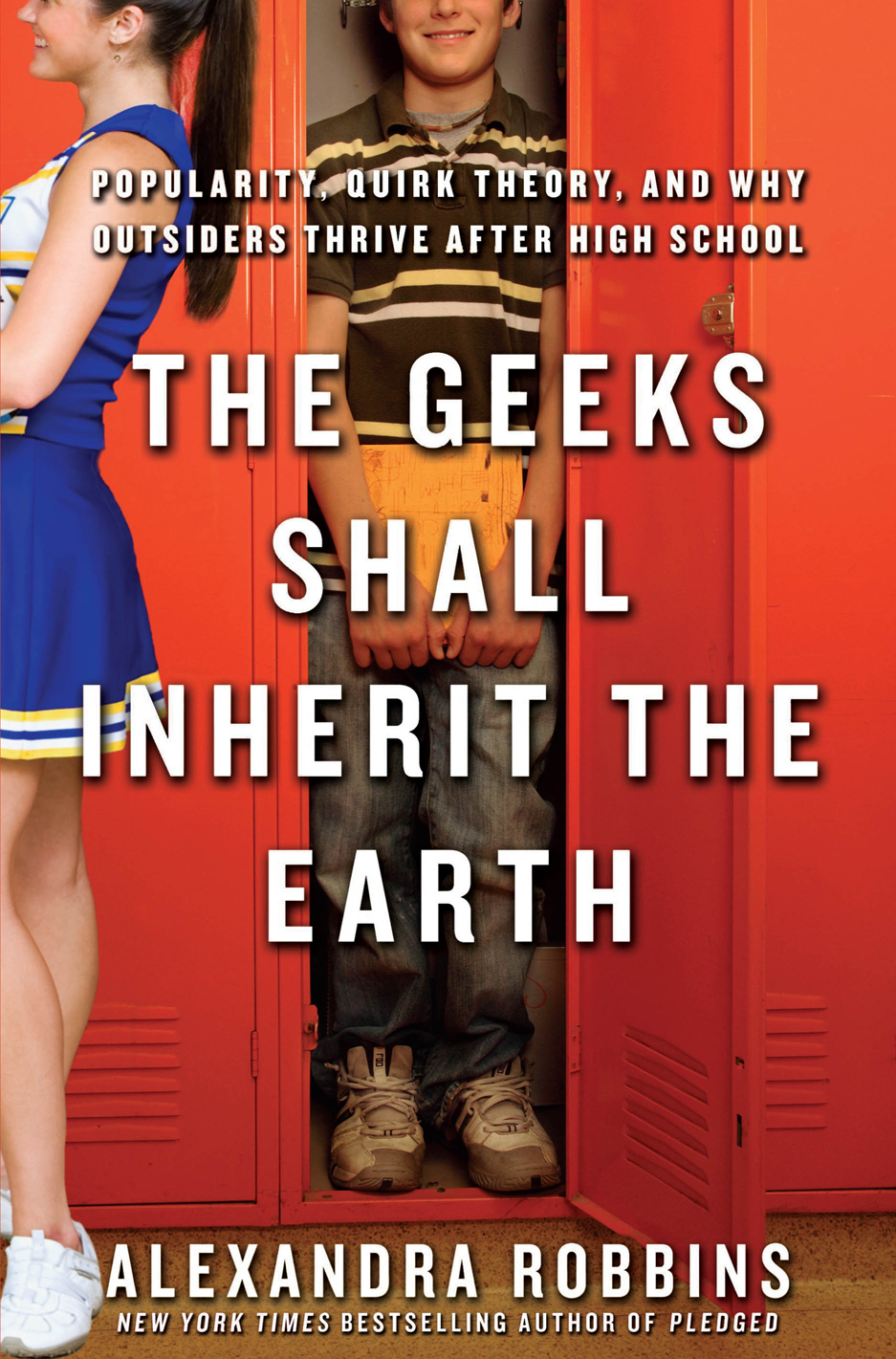
T O M Y F AMILY,
P AST AND P RESENT,
WITH U NCONDITIONAL L OVE
Contents
E arly 2011. Bullying in school has recently driven several teenagers to suicide. Exclusion and clique warfare are so rampant that the media declares bullying an epidemic and rallies for the public to view the tragedies as a national wake-up call.
Throngs of students who are not outright bullied are disheartened because it is getting increasingly more difficult to become an insider, to fit into a group, to be accepted as normal. Students feel trapped, despairing that in todays educational landscape, they either have to conform to the popular crowds arbitrary standardsforcing them to hide their true selvesor face dismissive treatment that batters relentlessly at their souls.
Schools struggle to come up with solutions. Even the most beloved parents are met with disbelief when they insist, This too shall pass. Adults tell students that it gets better, that the world changes after school, that being different will pay off sometime after graduation.
But no one explains to them why.
Enter quirk theory.
MEET THE CAFETERIA FRINGE
D ANIELLE, I LLINOIS | T HE L ONER
W hen the bell rang, Danielle slowly gathered her books as the rest of her class scrambled out of the room. She reluctantly made her way into the hall, slinging her green messenger bagbackpacks were too commonplaceover her shoulder.
The hallway was already beginning to empty as people disappeared into classrooms. Students didnt acknowledge Danielle and she didnt acknowledge them. She walked with her head down, slouching her five foot ten frame, her dark, shoulder-length hair shielding her face.
Stone Mill High, a large public school in a middle-class, racially diverse Chicago suburb, had a small cafeteria, which was why its two thousandplus students were divided into four lunch periods. Usually juniors were allowed to leave the building during lunch, but not on the first day of school. Tomorrow, and probably during the rest of the year, Danielle would avoid the cafeteria altogether.
Danielle wandered the halls for as long as she could, stopping to take a long drink from the water fountain and to pick up a form in the main office. Then she tried to walk nonchalantly past the cafeterias floor-to-ceiling glass wall, as if she just happened to be passing by. She could see students arranged predictably throughout the room. In front of the window sat the lucky students who had sprinted to the cafeteria to grab the small tables so they wouldnt have to sit at larger ones with students outside of their social circles. Behind them, underclassmen sat in rows of long tables. Goths, emos, and scene kids flanked the left side of the room, closest to the lunch detention area. Preppy popular students claimed the far corner of the cafeteria.
She scanned the room, searching ideally for any acquaintance at the end of a row whom she could join without intruding in the middle of a group. She couldnt find a single person she liked. On the bright side, she also didnt see Tabitha, the person she liked least at school, who would have been sitting among the preps.
The cafeteria had not been kind to Danielle in the past. She didnt think much anymore about the flick flick of projectile Skittles that a handful of friends pelted at her after they ousted her from their lunch table in sixth grade. She was still haunted by seventh grade, however. Until that year, Danielle had dressed like the tomboy she was. In seventh grade, she decided to start shopping at the stores other girls chattered aboutHollister, American Eaglein order to fit in.
Her strategy didnt work. Classmates grew even more hostile toward her. Former friends started a note fight. One girl wrote a message so painful that when Danielles mother came home from work that day, Danielle was uncharacteristically curled up in a fetal position on her bed. The school summoned the girls mothers to meetings, and when administrators saw the notes that Danielle had written in retaliation, they penalized both girls by barring them from the middle school honor society.
Meanwhile, half of Danielles class had joined the I Hate Dominoes Club, which people discussed in front of her. In a last-ditch effort to conform to the crowd, Danielle let students in her gym class persuade her to join the club too. Only a few moments later, she discovered that Dominoes was a pseudonym (she never found out why). The clubs real name was the I Hate Danielle Club. Danielle had joined her own hate club. Her classmates thought this was hilarious. When Danielle underwent dermatological surgery later that semester, the club leader said she hoped Danielle would die from the anesthesia.
On the last day of school, Tabitha, Danielles supposedly closest friend, passed her a note that said she didnt want to be friends anymore. Danielle told Tabitha it was dumb to end their friendship just because rejecting Danielle was the cool thing to do. That weekend, a group of girls called her from a party to which she hadnt been invited. They crowded around the speakerphone, telling her to stop threatening Tabitha. Danielle never forgave her.
Danielle hated reflecting on that year, but not because of the cruelty. She was most chagrined now because she had joined the group, unaware that it was my own hate club, because I thought that since everyone else was joining, I should too. I wish I hadnt been so stupid in thinking that I needed other peoples approval, even when I didnt even like most of them.
Because of that incident, Danielle withdrew, unwilling to trust anyone at school. She stopped talking to most people her age. Outside of school, for the next few years, she hung out only with four other girls: Mona, Paige, Camille, and Nikki, none of whom had many friends besides each other. Danielle liked these girls about 50 percent of the time; they could be funny and they usually got along. But they tended to neglect her such that Danielle often felt like an outcast even within her own tiny group. She stuck with them because they had been friends since kindergarten, even if the only thing they had in common was their past.
Danielle had other acquaintances, but they were just school friends, because I dont know how to ask them to hang out, and I suck at doing one-on-one things with people Ive never hung out with before, she said.
Danielle turned away from the cafeteria window and meandered down another hallway, attempting to quash her anxiety. If I dont find someone I know, Im going to end up standing alone at the front of the cafeteria. She hid in the bathroom for a few minutes, washing her hands to kill time, then waited by the sink until she decided to go to the library. On the way, Danielle bumped into Paiges freshman sister and followed her back to the lunchroom. They sat at the last of the underclassman tables at the far right side of the room.
That was how Danielle found herself spending the first lunch period of her junior year sitting silently among a bunch of freshmen she didnt know and, with the exception of her friends sister, didnt especially like. She left early to spend the rest of the forty-minute lunch in the snaking line of people waiting to see the guidance counselors to change their schedules. It was going to be another long year.
______
INTRODUCTION
CAFETERIA FRINGE: People who are not part of or who are excluded from a schools or societys in crowd.
What could motivate kids to be so heart-crushingly cruel that they convince a girl to join her own hate club? In the decade Ive spent examining various microcosms of life in U.S. schoolsfrom the multitude of students pressured to succeed in school and sports to the twentysomething products of this educational Rube Goldberg machinea disturbing pattern has emerged. Young people are trying frantically to force themselves into an unbending mold of expectations, convinced that they live in a two-tiered system in which they are either a resounding success or they have already failed. And the more they try to squeeze themselves into that shrinking, allegedly normative space, the faster the walls close in.
Next pageFont size:
Interval:
Bookmark:
Similar books «The Geeks Shall Inherit the Earth: Popularity, Quirk Theory, and Why Outsiders Thrive After High School»
Look at similar books to The Geeks Shall Inherit the Earth: Popularity, Quirk Theory, and Why Outsiders Thrive After High School. We have selected literature similar in name and meaning in the hope of providing readers with more options to find new, interesting, not yet read works.
Discussion, reviews of the book The Geeks Shall Inherit the Earth: Popularity, Quirk Theory, and Why Outsiders Thrive After High School and just readers' own opinions. Leave your comments, write what you think about the work, its meaning or the main characters. Specify what exactly you liked and what you didn't like, and why you think so.

